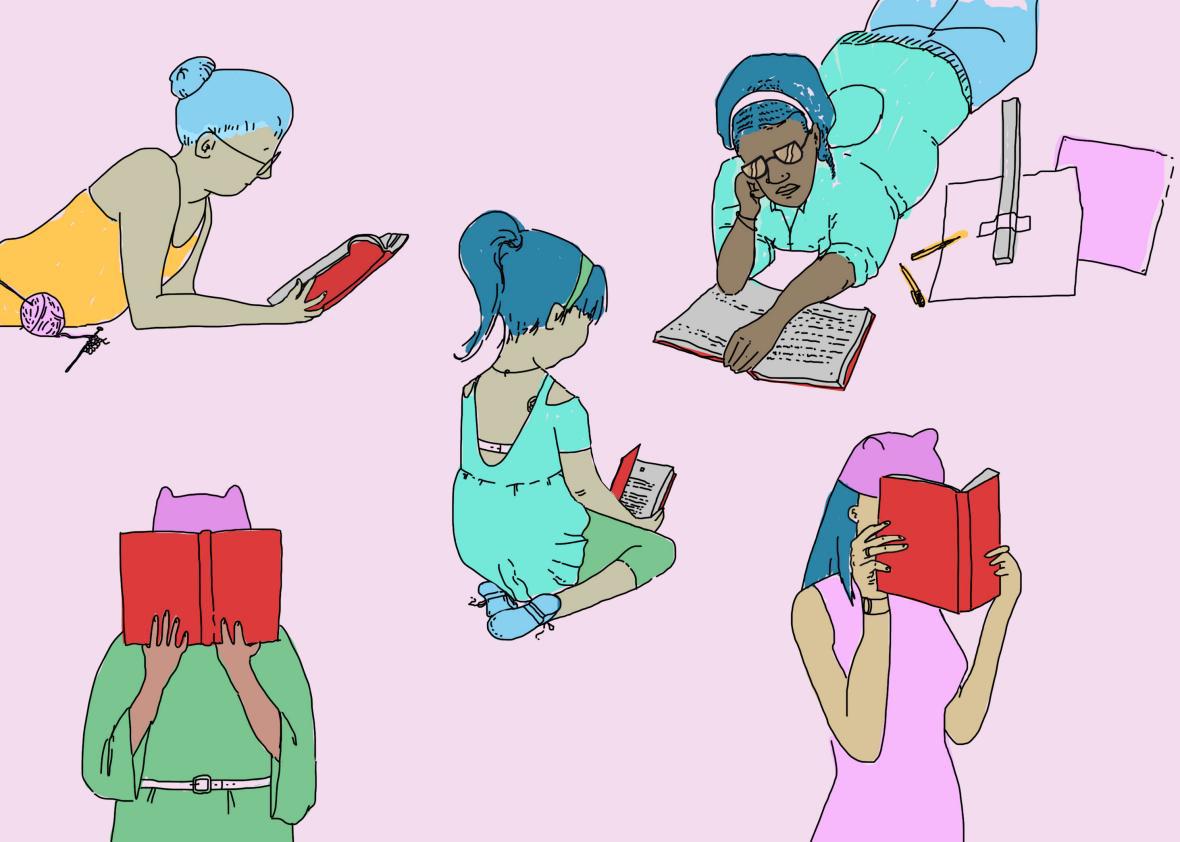A few months ago, my mom arrived at my house for a weekend visit toting a library hardback copy of lawyer and activist Bryan Stevenson’s 2014 best-seller Just Mercy, a memoir about his work with poor black clients in the South and the biased criminal justice system that ensnares them. She was reading it for her book club, she said, and come to think of it, they’d chosen several books with similar themes this year. My mom’s book club, like most book clubs, is made up of women—in her case, white and Jewish women in suburban Boston, far from Stevenson’s poverty-entrenched Alabama. But their reading appetites had turned toward themes of politics, race, and justice, in the months since Donald Trump was elected president.
Trump himself is a notorious nonreader; Maggie Haberman reported in the New York Times in January that the president “does not read books,” period. Nonetheless, he has managed to enliven Americans’ reading habits. The week after the election, Amazon’s best-seller lists included decades-old novels such as 1984, Brave New World, and The Handmaid’s Tale, dystopian classics that all of a sudden felt urgently prescient.
Book clubs in particular have felt the reverberations of the nation’s new literary cravings. Reading groups have long served as spaces for kindred spirits to gather and talk their way through weighty issues; they also skew female, older, and educated—a prime “resistance” cohort. It is hard to overstate how thoroughly the anti-Trump movement is driven by the energy of women in general. The Women’s March in January was the biggest single-day protest in American history, and women made up the majority of the crowds at the March for Science and the People’s Climate March in April. Women also seem to make up the vast majority of those calling their representatives: A recent poll by the popular service Daily Action, which sends texts to users nudging them to call their legislators, found 86 percent of active users were women, and fully half were aged 46 to 65. As a Slate headline put it in January, “The Trump Resistance Will Be Led by Angry Women.”
Some independent bookstores, progressive media outlets, and activist groups have launched new clubs to meet the moment. In Seattle there’s “Reading Through It: A Post-Election Book Club.” (First selection: J.D. Vance’s Hillbilly Elegy, a memoir of growing up in a poor white family in what is now Trump country.) Daily Action launched its own club in March, “drawing on America’s heritage of resistance.” (Latest up: Historian Timothy Snyder’s 21st century–minded survey of 20th-century Europe, On Tyranny.) “No longer can book club be the latest vampire YA novel (or at least, no longer can that be the ONLY book club we do),” the online magazine Argot wrote in announcing its Trump-era book club. “And for those of us who aren’t book club people, we can no longer read our radical texts, relevant novels and pertinent essays in silence.” Its first assignment: the Melville House collection What We Do Now: Standing Up for Your Values in Trump’s America.
“The books that people seek are reflective of what’s weighing on their minds,” said Zazu Galdos-Shapiro, a buyer at the Bookloft, a store in Great Barrington, Massachusetts, that started a “Conscientious Readers” discussion group in April. She started the group after noticing which books were really flying off the shelves postelection: Just Mercy and Hillbilly Elegy as well as Ta-Nehisi Coates’ mournful letter to his black son, Between the World and Me, and Colson Whitehead’s novel of a young slave’s harrowing escape from bondage, The Underground Railroad. (It’s amazing how often those four titles came up in reporting this story.)
Meanwhile, some established clubs have found their attentions shifting subtly. Anne Onion (mother of Slate staff writer Rebecca Onion) has belonged to the same book group for 41 years in a small town in New Hampshire. When the group first started meeting in the 1970s, it read primarily literary fiction. Four or five years ago, she said, they started reading more nonfiction. The women are progressives in a town that voted for Trump, and they’ve used the club as a means of discussing the divide between them and their neighbors. Books they are considering for the near future include Underground Railroad, Hillbilly Elegy, and Small Great Things, Jodi Picoult’s 2016 novel about the racial awakening of a well-intentioned but clueless white woman.
Novels are the mainstay of the traditional book club experience: A 2015 survey found that 70 percent of book clubs read fiction most of the time. But Onion’s club reflects a broader trend toward nonfiction reading. Print sales of adult nonfiction rose almost 7 percent in both 2015 and 2016 while fiction sales ticked up and then down. (Some but not all of nonfiction’s momentum came from the adult coloring-book boom.) Julie Todaro, the president of the American Library Association, said she has started to see nonfiction making inroads into “one book” programs, the communitywide reading initiatives that essentially serve as book clubs for entire cities and states. About five years ago, she said, more of those programs began making nonfiction selections. (This past weekend, the ALA launched Book Club Central, a hub of resources and recommendations for clubs; its first pick is Stephanie Powell Watts’ debut novel No One Is Coming to Save Us.)
As for my mom’s book club, its list for 2017 has included The Underground Railroad, Between the World and Me, and Just Mercy; Hillbilly Elegy is on the docket for next year. (Meanwhile, in January several club members attended the Women’s March together in Boston.) Another club member, Julie Weinstein, told me the selections were not necessarily a direct result of the election but something more like a response to deeper shifts. Until recently, “a lot of people in this group have not been very political, except on the local level,” Weinstein said. “But times have changed.” As an era changes, so does its reading list.
